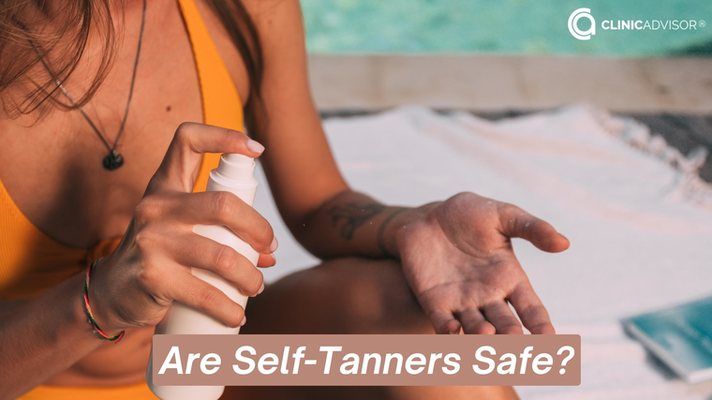
Self-tanners offer a sun-kissed glow without having to be exposed to the sun. These products have become essential for people seeking to enhance their complexion while avoiding the harmful effects of UV radiation. Despite self-tanners increasing popularity, questions regarding their safety and potential risks have emerged, prompting research and regulations to ensure consumer safety.
So, are self-tanners safe and do they pose any risks to our health?
This article will delve into the safety aspects of self-tanners, providing insights into their ingredients, usage, and the regulatory landscape governing their production.
An Overview
Self-tanners primarily work through the action of dihydroxyacetone (DHA). This sugar compound reacts with the amino acids in the dead layer of the skin, creating a pigment called melanoidin, and producing a color change. This temporary effect typically lasts several days, fading as the skin naturally exfoliates.
What are the main ingredients in self-tanners?
The primary active ingredient in self-tanners is dihydroxyacetone (DHA), a color additive that temporarily darkens the skin by reacting with amino acids in the skin's surface layer. Other common ingredients may include moisturizers like aloe vera or glycerin, antioxidants such as vitamin E, and natural oils for skin conditioning.
Is DHA in self-tanners bad for you?
DHA, the active ingredient in most self-tanners, is considered safe for topical and external use by the FDA. Concerns have been raised about potential inhalation risks during the application of spray-on tans, but topical application is generally safe when used as directed.
Are self-tanners safe to use?
Yes, self-tanners are generally safe to use when applied as directed. The main active ingredient in self-tanners, dihydroxyacetone (DHA), is approved by the FDA for external application. However, following application guidelines and conducting a patch test to check for skin reactions is important.
Are self-tanners safe for all skin types?
Self-tanners are generally considered safe for most skin types when used according to the product instructions. However, individuals with sensitive skin or allergies should perform a patch test before full application. It's also advisable to consult with a dermatologist if you have any skin conditions or concerns.
Are fake tans unhealthy?
Fake tans, or self-tanners, are not considered unhealthy when used properly and externally. They offer a safer alternative to obtaining a tan compared to being exposed to UV rays from the sun or tanning beds, which can lead to skin damage and increase the risk of skin cancer.
Are self-tanners safe for the face?
Self-tanners can be safe for the face if the product is formulated for facial skin, which can be more sensitive than body skin. You can look for non-comedogenic self-tanners designed specifically for facial use to avoid clogging pores and causing breakouts.
How can I choose a safe self-tanner?
To choose a safe self-tanner, look for products from reputable brands that list their ingredients clearly. Opt for the best self-tanners that are free from harmful chemicals or allergens that you might be sensitive to. Additionally, you can read product reviews, and seek recommendations from trusted sources. This will help you make an informed choice.
Does self-tanner have harmful chemicals?
While self-tanners are authorized for external use by regulatory bodies such as the FDA and deemed safe, some products may contain chemicals or fragrances that can irritate sensitive skin. It's advisable to review the ingredient list for potential allergens or harmful chemicals and choose products with safer, more natural ingredients.
Harmful ingredients in self-tanner
Some self-tanners might contain ingredients like parabens, phthalates, or certain fragrances that could be harmful or cause skin irritation for some individuals. It's recommended to opt for products with a transparent ingredient list and avoid known irritants.
What precautions should I take when using self-tanners?
When using self-tanners, it's important to:
- Conduct a patch test 24 hours before full application to check for allergic reactions.
- Wear gloves during application to prevent staining your palms.
- Apply the product evenly to avoid streaks and blotches.
- Avoid contact with eyes, lips, and mucous membranes.
- Wait for the product to dry completely before getting dressed to avoid staining clothes.
- Use sunscreen since self-tanners do not protect you from UV rays.
What are the bad side effects of self-tanner?
Currently, there is no evidence to suggest significant long-term effects from using self-tanners as directed. DHA has been approved for external use by the FDA, indicating it is safe for cosmetic use. However, as with any cosmetic product, continuous monitoring and research are essential.
How do regulations ensure the safety of self-tanners?
Regulations ensure the safety of self-tanners by requiring manufacturers to list all ingredients and adhere to safety guidelines established by regulatory bodies, such as the FDA in the United States. Products must undergo safety assessments and testing to verify that they are safe for consumer use. Manufacturers must also report any adverse reactions associated with their products.
Are self-tanners safe during pregnancy?
Self-tanners during pregnancy are generally considered safe for topical use. However, as a precaution, it may be better to limit the use of self-tanners to avoid the effects of inhaling spraying tans, which are unknown, and consult with your healthcare provider for personal advice.
Does self-tanner cause cancer?
There is no conclusive evidence that suggests self-tanners cause cancer. Self-tanners are a safer alternative to UV exposure, which is a known risk factor for skin cancer. However, it's important to use self-tanners as directed and continue to apply sunscreen for protection against UV radiation.
Is it bad to fake tan every week?
Applying a fake tan every week is generally not bad if you're following the product's instructions and taking care of your skin. However, excessive use without proper skin care may lead to dryness or irritation. Ensure you're moisturizing regularly and exfoliating between applications to maintain healthy skin.
Finding the Safest and Best Self-tanner
Having explored the safety, ingredients, and regulations surrounding self-tanners, you're now well-equipped with the knowledge to choose your best self-tanners with confidence. However, the journey doesn't end here. With an array of options available, finding the best self-tanner that aligns with your skin type, desired shade, and additional skincare needs can still be a challenge.
That's why we have prepared a list of the best self-tanning products to illuminate your path. Whether you're looking for a product that caters to sensitive skin, aims for a specific tone, or seeks a formula enriched with moisturizing ingredients, our comprehensive guide has you covered.
Explore our detailed guide on the Best Self-Tanner 2024 and achieve your perfect tan today!
In a Nutshell,
As the demand for self-tanners grows, so does the importance of understanding their safety and efficacy. While self-tanners offer a safer alternative to sunbathing and tanning beds (UV exposure), users should remain informed about the products they choose to apply to their skin. By selecting reputable brands, following application instructions carefully, and paying attention to skin reactions, individuals can enjoy the benefits of self-tanners with peace of mind.








Share Your Opinion, Please